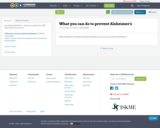
preventing Alzheimer's, Aging, the aging brain, TED Talk 2017 by Lisa Genova
- Subject:
- Applied Science
- Material Type:
- Lecture Notes
- Date Added:
- 05/02/2017

preventing Alzheimer's, Aging, the aging brain, TED Talk 2017 by Lisa Genova
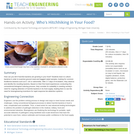
How can you tell if harmful bacteria are growing in your food? Students learn to culture bacteria in order to examine ground meat and bagged salad samples, looking for common foodborne bacteria such as E. coli or salmonella. After 2-7 days of incubation, they observe and identify the resulting bacteria. Based on their first-hand experiences conducting this conventional biological culturing process, they consider its suitability in meeting society's need for ongoing detection of harmful bacteria in its food supply, leading them to see the need for bioengineering inventions for rapid response bio-detection systems.
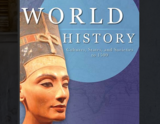
World History: Cultures, States, and Societies to 1500 offers a comprehensive introduction to the history of humankind from prehistory to 1500. Authored by six USG faculty members with advance degrees in History, this textbook offers up-to-date original scholarship. It covers such cultures, states, and societies as Ancient Mesopotamia, Ancient Israel, Dynastic Egypt, India’s Classical Age, the Dynasties of China, Archaic Greece, the Roman Empire, Islam, Medieval Africa, the Americas, and the Khanates of Central Asia. It includes 350 high-quality images and maps, chronologies, and learning questions to help guide student learning. Its digital nature allows students to follow links to applicable sources and videos, expanding their educational experience beyond the textbook. It provides a new and free alternative to traditional textbooks, making World History an invaluable resource in our modern age of technology and advancement.
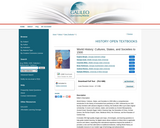
World History: Cultures, States, and Societies to 1500 offers a comprehensive introduction to the history of humankind from prehistory to 1500. Authored by six USG faculty members with advance degrees in History, this textbook offers up-to-date original scholarship. It covers such cultures, states, and societies as Ancient Mesopotamia, Ancient Israel, Dynastic Egypt, India’s Classical Age, the Dynasties of China, Archaic Greece, the Roman Empire, Islam, Medieval Africa, the Americas, and the Khanates of Central Asia.
It includes 350 high-quality images and maps, chronologies, and learning questions to help guide student learning. Its digital nature allows students to follow links to applicable sources and videos, expanding their educational experience beyond the textbook. It provides a new and free alternative to traditional textbooks, making World History an invaluable resource in our modern age of technology and advancement.
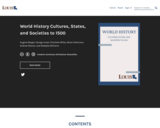
Survey of world history from ancient civilizations to 1500.
Chapter 1: Prehistory
Chapter 2: Early Middle Eastern and Northeast African Civilizations
Chapter 3: Ancient and Early Medieval India
Chapter 4: China and East Asia to the Ming Dynasty
Chapter 5: The Greek World from the Bronze Age to the Roman Conquest
Chapter 6: The Roman World from 753 BCE to 500 CE
Chapter 7: Western Europe and Byzantium circa 500 - 1000 CE
Chapter 8: Islam to the Mamluks
Chapter 9: African History to 1500
Chapter 10: The Americas
Chapter 11: Central Asia
Chapter 12: Western Europe and Byzantium circa 1000 – 1500 CE

World History, Volume 1: to 1500 is designed to meet the scope and sequence of a world history course to 1500 offered at both two-year and four-year institutions. Suitable for both majors and non majors World History, Volume 1: to 1500 introduces students to a global perspective of history couched in an engaging narrative. Concepts and assessments help students think critically about the issues they encounter so they can broaden their perspective of global history. A special effort has been made to introduce and juxtapose people’s experiences of history for a rich and nuanced discussion. Primary source material represents the cultures being discussed from a firsthand perspective whenever possible. World History, Volume 1: to 1500 also includes the work of diverse and underrepresented scholars to ensure a full range of perspectives.
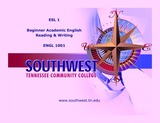
This file contains writing lessons and assignments for a Level 1 academic ESL class with an emphasis on writing paragraphs. It can be combined with the other files in this folder to create an entire OER based class.
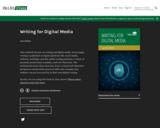
This textbook focuses on writing and digital media. Increasingly, writing is published on digital platforms like social media, websites, and blogs, and this online writing performs a variety of personal, professional, academic, and civic functions. The textbook discusses these functions from a critical and rhetorical perspective and provides practical skills and strategies that students can put into practice in their own digital writing.